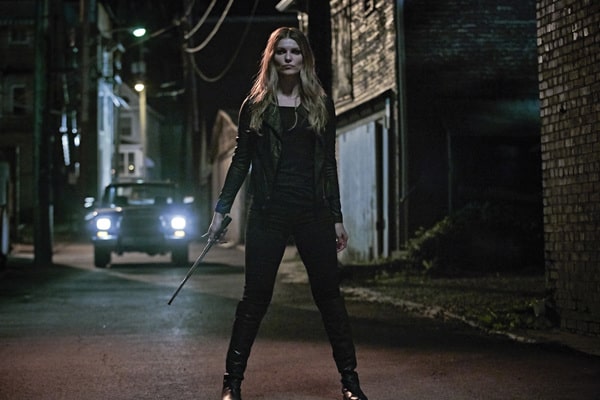
While the mantra “nobody’s bleeding yet” certainly holds true throughout (most) of Banshee‘s fourth season premiere, there’s certainly a deep undercurrent of pain flowing through each and every quiet, reflective moment of “Something Out of the Bible”. The unexpected somberness comes from a number of places, but it’s most sharply defined by the show’s portrayal of the passage of time; Banshee‘s final season begins 24 months after the events of “We All Pay Eventually”, which makes the familiar shadows hanging over its characters even longer and darker than expected. As always, the players of Banshee can’t escape their pasts, stories both familiar and fresh to the audience – and as expected, Banshee turns this into compelling drama, even without the normal dose of fists and blood splatters.
Instead, what “Something Out of the Bible” offers is a little more ambitious and out of character for Banshee; sure, there are a few scenes where Carrie beats the crap out of some dudes vigilante-style, and Calvin crushing a guy’s head to maintain a deal with Proctor. However, it’s ambitions are a mixed bag: as much as the time jump and fresh character directions give the show ample storytelling room for its final season, Banshee has fallen victim to the Serial Killer Fetish, even consuming the life of a main character – poor, poor Rebecca – in order to establish it as a centerpiece for the final season. I certainly can appreciate the noir aspects of “Something Out of the Bible”, bringing back the ghost of Hood when Rebecca’s gruesome murder pushes the players of Banshee, PA back to the center of the table. Everything around this story is so interesting: but when you consider how it fridges one of its best (and only remaining) female characters for the sake of an unnecessary plot, there’s a certain nagging feeling about Rebecca’s death “Something” can’t completely escape, even considering how awesome everything around it is.
The most engaging material of the hour is what surrounds the reveal of Rebecca’s death, led by Brock finding a completely broken, desolate Hood living in a cabin in the Foothills, on property owned by Proctor. Devastated by his failure to find Job two years ago (along with whatever else happened with him and Carrie along the way), Hood’s departure marks a massive change for Banshee, which has gotten larger and more affluent since Proctor took over as mayor. That alone is juicy enough to fuel the proceedings, past and present, of Banshee‘s season premiere: layering in the stories of Carrie, Bunker and his brother Calvin, and brief glimpses of Proctor in (legally-binding) power only elevates the hour further, making sure the Banshee spirit remains alive, in the face of all the time jumps and serial killer stories, which morph Banshee into something unexpected – and frankly, a little disappointing.
That’s not to say Hood’s presence in this episode itself is disappointing: seeing his character regress into bearded, heartless stone gives great emotional depth to this hour, which otherwise is nothing but new developments (Proctor is mayor/Brock is sheriff! Carrie’s crying while she rebuilds her house!) and narrative track-laying. His sad, stoic scenes are the backbone of the entire hour-long affair – which of course, is most effective when its spent reflecting on the fallout of the heist team after Job disappears (and Hood murders Dalton, killing what I thought would be a major season four story line) and Hood disappears into the woods without a trace. Hood’s pain in this hour is so effectively portrayed by Antony Starr, the entire hour feels like its being pulled in the gravitation of his own deep, resigned depression: he may not be able to kill himself, but he’s put himself out in the woods to die for his failures, a weight that is felt in every scene with and without him through the hour.
Honestly, even Rebecca’s death may not turn out to be disappointing: following in the footsteps of Siobhan’s brutal death last season, however, it feels a little like Banshee building its empathy for its male characters by killing another primary female character. Siobhan’s death mattered, though, and if Banshee can continue to build out Rebecca’s story between the past and present, effectively keeping her alive as a character and avenue for reflection for Proctor and Hood outside of the context of this silly serial killer stuff, it could turn out to be the most important development of Banshee‘s final season.
Tasking itself with such an ambitious structure for its shortened final season provides Banshee with a number of intriguing directions to take; only time will tell whether the investigation into Rebecca’s murder will cloud these important developments, or offer a powerful framing device for the brutish double punch of emotional resonance and violent pulp action Banshee has made its forte over three seasons. Regardless of how it turns out, “Something Out of the Bible” establishes that the final season of Banshee will be quite different than its first three, a brave, exciting declaration for a show with such a dedicated fan base and established stylistic sensibility.
 Follow Us
Follow Us






Visitor Rating: 5 Stars
Visitor Rating: 2 Stars
Visitor Rating: 4 Stars